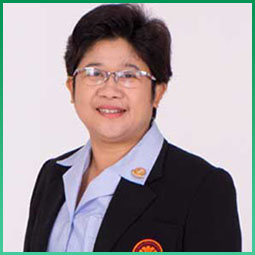
Jeeraporn Kummabutr
Thammasat University , ThailandTitle: Factor predicting resilience among family caregivers of patients with chronic illness in community at the fourth regional health office area, Thailand
Abstract
Nowadays, chronic disease is an important health problem for Thai people and tends to increase significantly. Caring for chronic patients at their home is necessary to rely on family caregivers and become boredom, burden, or stress that affects both physical and psychosocial health. Resilience is the ability of a person to overcome obstacles.
A descriptive, correlational predictive design was conducted in 2019-2022. The objective was to identify factors predicting resilience among family caregivers of patients with chronic illness. The PRECEDE-PROCEED model was applied as conceptual framework. The sample consisted of 172 caregivers, ages 20-60 years old who were selected through multistage random sampling. Sample size represented the value in the G*power version 3.1 with a medium effect size of .16 from previous study. Data collection was done by self-administered questionnaire which were tested for content validity and reliability. Content validity was .89. Cronbach’s alpha coefficients and KR-20 were higher than 0.70. Data analysis was done using descriptive statistics, Pearson correlation coefficient and multiple regression analysis by Enter method predicting preventive behavior. Statistic assumption testing were done.
The result showed that the caregivers' resilience was at a normal level (X = 61.40, SD = 8.735). It was found that caregiver’s age, stress, knowledge, attitude, self-esteem, and family functioning predicted caregivers' resilience at 56.6 percentage (F = 21.001, p-value = .000, R= .752, R2=.566, Adj R2=.539). In addition, the findings revealed that caregiver’s age, attitude, self-esteem, self-efficacy, social support and family functioning were significantly and positively correlated with caregivers' resilience (p < .05). Caregiver’s age, and stress were significantly and negatively correlated with caregivers' resilience (p < .05). The finding suggested that health care providers should support family caregivers to gain knowledge, to enhance attitude, self-efficacy, and self-esteem, to relieve stress, and to promote family functioning in order to promote caregivers' resilience.
Biography
Dr. Jeeraporn Kummabutr serves as position of assistant professor at Department of Community Health Nursing, Faculty of Nursing, Thammasat University since 2006-present and she also served in the Director of Master of Nursing Science Program in Community Nurse Practitioner. Besides, she received her Doctoral Degree in Philosophy (Nursing) from Mahidol University, Thailand in 2012; she also completed the Parent Advisor Training Course in 2010 at Florence Nightingale School of Nursing & Midwifery, King’s College, and University of London, UK.
Her responsibilities include teaching nursing students and conducting research on resilience, parent participation, and child life skills development. She has been serving as an editorial board member of several reputed journals

.png)